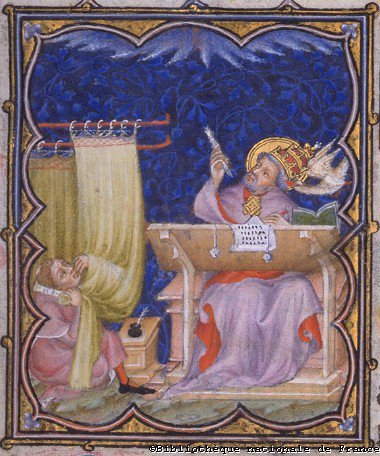 Gregory the Great was born in Rome at some time around 540. His father, Gordianus, was a wealthy patrician with a fine town house on the Coelian
Hill and large estates in Sicily. More important than noble blood and great
wealth, this family had a strong Christian spirit. Gregory's mother,
Sylvia, was honored as a saint as were his father's two sisters, and John
the Deacon can speak of Gregory's education as that of a saint among
saints.
Gregory the Great was born in Rome at some time around 540. His father, Gordianus, was a wealthy patrician with a fine town house on the Coelian
Hill and large estates in Sicily. More important than noble blood and great
wealth, this family had a strong Christian spirit. Gregory's mother,
Sylvia, was honored as a saint as were his father's two sisters, and John
the Deacon can speak of Gregory's education as that of a saint among
saints.
Gregory, with his wealth and family influence, soon became prefect of the
city. While in this high position he decided to give up a career in the
world for the life of a monk. Never halfhearted, Gregory used his six
Sicilian estates to found monasteries and turned his Coelian Hill residence
into another, dedicated to St. Andrew. Here he lived the simple, prayerful
life of a monk. His retirement was interrupted. Pope Pelagius II sent
Gregory as ambassador to the imperial court in Constantinople. After six
years at the capital Gregory was allowed to return to his beloved
monastery, of which he became abbot.
Probably at this period of his life Gregory saw the Saxon slaves who so
stirred his zeal. He tried to go to England, indeed actually received the
Pope's blessing and was on his way. But the Romans, who loved the abbot
of St. Andrew's, raised so loud a protest that Gregory was recalled.
In 590 when Pope Pelagius died, Gregory was unanimously chosen to succeed
him. Reluctantly he had to exchange the quiet life of a monk for the
ceaseless activity of the pope. But always eager to do God's will, Gregory
plunged manfully into his new work and filled fourteen years with great
achievements.
As an administrator Gregory kept a watchful eye on the vast estates which
formed the patrimony of Peter. But the money that efficient management
brought into the treasury the Vicar of Christ's great charity caused to
flow out just as rapidly.
Faced with the frightful menace of the Lombards, Gregory worked hard and
intelligently to save Rome from devastation. Although the pope was not at
that time the highest civil authority in Italy, the weakness and
incompetence of the imperial officials threw a heavy burden on Gregory's
broad shoulders. In spite of Lombard ferocity and Byzantine fecklessness,
Gregory managed to bring a measure of peace to bleeding Italy.
Gregory made several improvements in the liturgy, and his name is
immortalized in the Gregorian chant.
Once pope, Gregory did not forget the English. He sent St. Augustine on his
historic mission in 597 and thus accomplished by another what he had longed
to do himself. He worked hard with St. Leander to convert the still Arian
Spanish Visigoths, and also paved the way for the conversion of the
Lombards.
Gregory was a popular preacher and a writer
whose works lived. His style, while not that of Cicero or Augustine, was
suited to the rougher and simpler taste of his day and of darker days to
come. Gregory's Homilies, Dialogues, and Pastoral Care did much to form
the minds of the men of the early middle ages.
Gregory protected the Jews at a time when other rulers were giving them
a bad time.
The great Pope died in 604 with Italy at peace, the conversion of Spain
accomplished, and that of England under way. He deserves to be called
Gregory the Great, but the title which suits the noble old Roman best was
that given to him in an early epitaph--God's Consul.
Excerpted from "Popes
Through the Ages" by Joseph Brusher, S.J.

